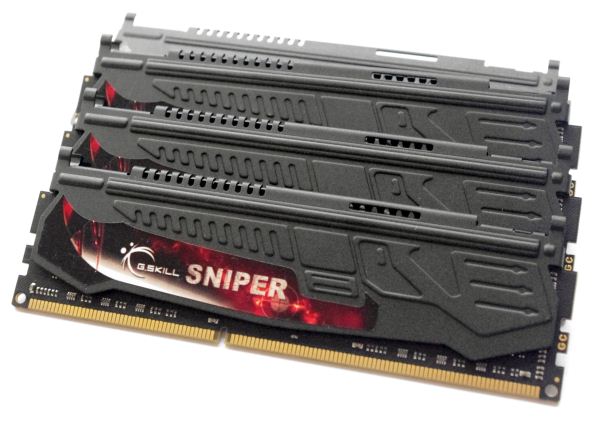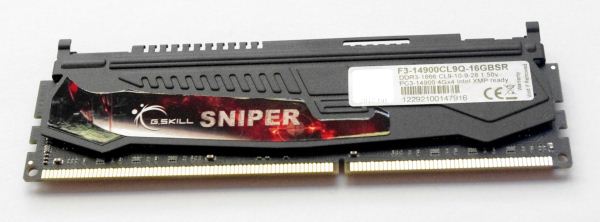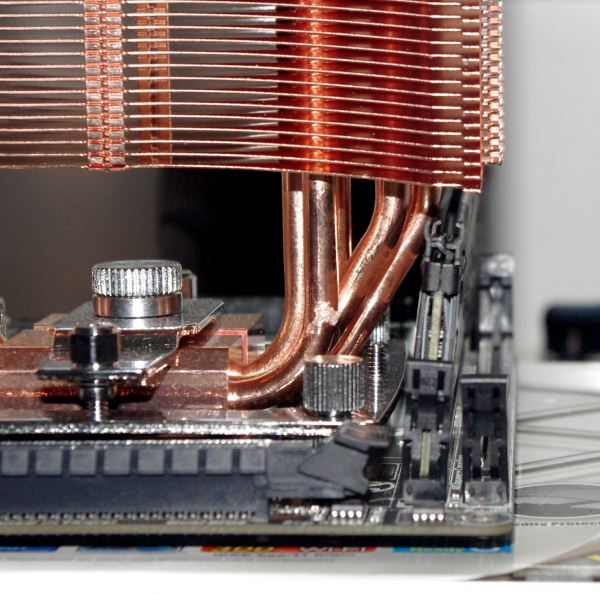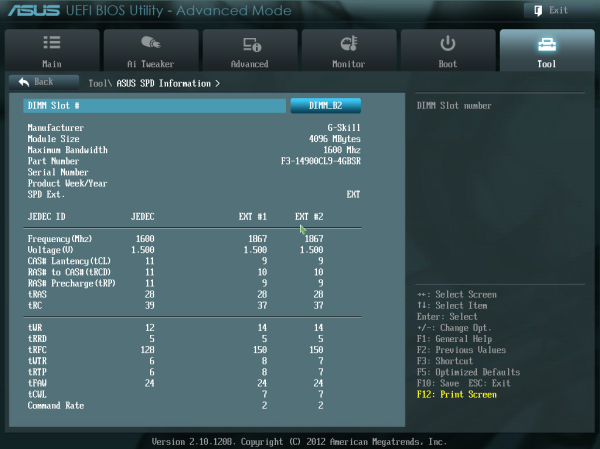Memory Performance: 16GB DDR3-1333 to DDR3-2400 on Ivy Bridge IGP with G.Skill
by Ian Cutress on October 18, 2012 12:00 PM EST- Posted in
- Memory
- G.Skill
- Ivy Bridge
- DDR3
As mentioned in the DDR3-1600 kit, as processors develop the manufacturers raise the minimum speed to which those processors and memory controllers are rated. This means that higher speed memory kits are guaranteed, and as such the market has to adjust – with the high end Trinity processors supporting DDR3-1866 out of the box, the rest of the spectrum will rise to cover this. As a result, the memory manufacturers have to argue for better deals over their ICs, and make sure the design of the ICs will secure higher yields of the faster stuff which they can sell on to the users. Our leap from DDR3-1600 to DDR3-1866 is a leap from an $80 kit to a $95 kit, or an increase in ~19% in the price.
Visual Inspection
The Sniper kits are the oddest of G.Skill’s lineup. As we can see in the images below, the heatsink is shaped like a rifle. Bonus points if you can tell us what rifle it is meant to be. The benefits of having a rifle as a heatsink may point towards building a Gigabyte G-series system or MSI Big Bang XPower rig, both of which take designs using weapons as part of the standard. Apart from this, there is not much benefit to a stylized heatsink such as this – heat dissipation will be similar to the other kits in this review, and the main reason for this heatsink is to protect the user and competition from knowing what ICs are under the hood.
As with the RipjawsX kit, I placed a module of the kit in our system with the TRUE Copper, just to see the effect of having a large air cooler would have on the nearest memory module on a motherboard:
Again due to the height of the module, large air coolers that impinge on the memory slots will cause the Sniper kits to be placed at an angle.
JEDEC + XMP Settings
| G.Skill | |||||
| Kit Speed | 1333 | 1600 | 1866 | 2133 | 2400 |
| Subtimings | 9-9-9-24 2T | 9-9-9-24 2T | 9-10-9-28 2T | 9-11-10-28 2T | 10-12-12-31 2T |
| Price | $75 | $80 | $95 | $130 | $145 |
| XMP | No | Yes | Yes | Yes | Yes |
| Size | 4 x 4 GB | 4 x 4 GB | 4 x 4 GB | 4 x 4 GB | 4 x 4 GB |
|
|
|||||
| MHz | 1333 | 1600 | 1867 | 2134 | 2401 |
| Voltage | 1.500 | 1.500 | 1.500 | 1.650 | 1.650 |
| tCL | 9 | 9 | 9 | 9 | 10 |
| tRCD | 9 | 9 | 10 | 11 | 12 |
| tRP | 9 | 9 | 9 | 10 | 12 |
| tRAS | 24 | 24 | 28 | 28 | 31 |
| tRC | 33 | 33 | 37 | 38 | 43 |
| tWR | 10 | 12 | 14 | 16 | 16 |
| tRRD | 4 | 5 | 5 | 6 | 7/6 |
| tRFC | 107 | 128 | 150 | 171 | 313 |
| tWTR | 5 | 6 | 8/7 | 9/8 | 10/9 |
| tRTP | 5 | 6 | 8/7 | 9/8 | 10/9 |
| tFAW | 20 | 24 | 24 | 25 | 26 |
| tCWL | - | 7 | 7 | 7 | 7 |
| CR | - | 2 | 2 | 2 | 2 |





















114 Comments
View All Comments
andrewaggb - Friday, October 19, 2012 - link
Fair enough :-)HisDivineOrder - Thursday, October 18, 2012 - link
You "remember" getting your first memory kit and it was for a E6400. You act like that's just this classic thing.I remember getting a memory kit for my Celeron 300a. I remember getting a memory kit for my AMD K6 with 3dNow!.
Wow, I'm old.
silverblue - Thursday, October 18, 2012 - link
I remember getting a 64MB PC100 DIMM in 2000... it was pretty much £1 a MB. Made a difference, so it was *gulp* worth it.StormyParis - Thursday, October 18, 2012 - link
Very interesting read. Thank you.rscoot - Thursday, October 18, 2012 - link
I remember paying upwards of $400 for a pair of matched 2x512MB Kingston HyperX modules with BH-5 chips. Those were the days! 300MHz at 2-2-2-5 1T in dual channel if you could put enough volts through them. Nowadays I don't think memory matters nearly as much as it did back then.superflex - Thursday, October 18, 2012 - link
Your first kit was an E6400?Let me know when you get hair down there.
My first computer was an Apple IIe in 1984, and my first build was an Opteron 170 with 400 MHz 2,2,2,5 DDR.
Magnus101 - Thursday, October 18, 2012 - link
Once again this only confirms that memory speed makes no real world difference.I mean, who in their right mind use the integrated GPU on an expensive i7-system to play metro-2033 with single digit framerate?
The only thing standing out is the Winrar compression, but, how many use winrar for compression?
Yes to decompress files it is very common but I only remember using it 2-3 times in my whole life to compress my own files.
So that isn't important to most users, except for the ones that actually use winrar to compress files.
And I don't get why the x264 encoding seemed like a big deal. The differences were very small.
It's beem the same story all the way back to the late 90;s were tests between sdr memory at 100 and 133 MHz or at different timings showed no differences in real life applications in contrast to synthetics.
But sure, if you are building a new system and choose between, let say 1333 or 1600, then a $5 difference is a no brainer.
Then again, it would make no noticeable difference anyway.
silverblue - Thursday, October 18, 2012 - link
Here's one - will it affect QuickSync in any way?twoodpecker - Monday, October 22, 2012 - link
I'd be interested in QuickSync results too. In my experience, not proven, it makes a big difference. I adjusted my memory speeds from 1600 to 2000 and noticed at some point that encoding is 25x instead of 15x. This might be due to different factors though, like software optimizations, because I didn't benchmark after adjusting mem speeds.Geofram - Thursday, October 18, 2012 - link
I don't believe he's implying that single digit frame rates on a game are going to real-life usable for anyone. I believe the point of the test was simply: "Lets take a system that is generally fast and put it in a situation where the IGP is being stressed. This will be the best-case scenario for faster RAM helping it. Lets see if it does".To me the idea was not showing everyone everyday situations where faster RAM will help them, instead it was to see where those situations might lay, by setting up a stressful situation and seeing the results. Most of the results were extremely small differences.
I agree it's not a noticeable difference in most cases. It doesn't make me feel like I should get rid of PC1333 RAM. I don't fault the logic for the tests used however. It was nice to see someone actually comparing the slight differences caused by RAM speed.